Reflection on Scientific Methods and Popperian Hypothetico-Deductivism
VerifiedAdded on 2021/05/31
|6
|1261
|65
Essay
AI Summary
This essay provides a comprehensive reflection on scientific methods, with a particular emphasis on the Popperian hypothetico-deductivist approach. The introduction establishes the importance of scientific methods and their rationality. The analysis delves into Popper's theory, explaining how scientific inquiry proceeds through hypothesis formation and the crucial role of falsification. The essay examines the advantages and disadvantages of Popper's approach, including its impact on scientific progress and the challenges it faces. It also discusses falsifiability and its connection to the validity of arguments. The essay concludes by highlighting the significance of Popper's framework for generating testable theories and the ongoing debate about the falsifiability of scientific claims. The student acknowledges the building blocks of Popper’s work, and how it allows for the development of multiple theories.
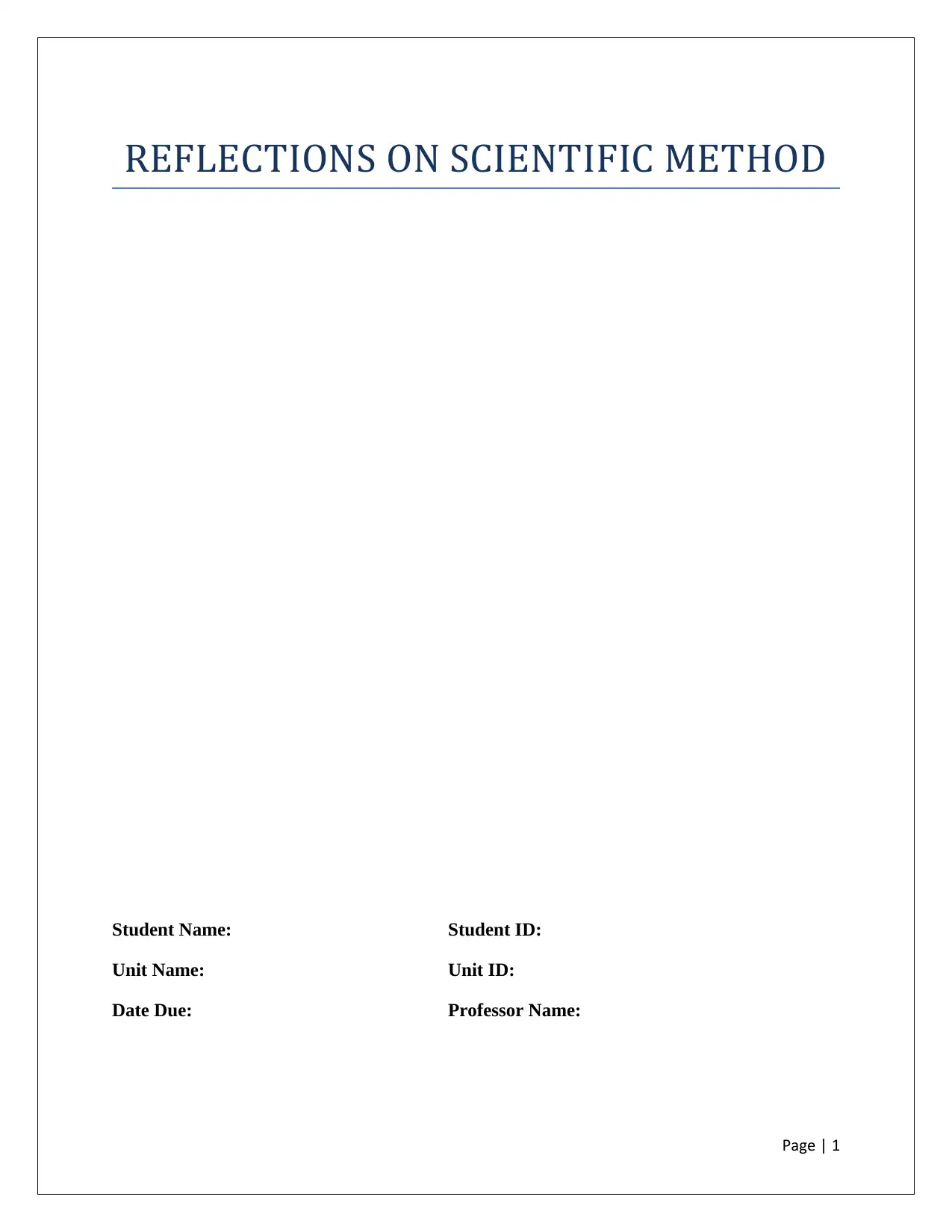
REFLECTIONS ON SCIENTIFIC METHOD
Student Name: Student ID:
Unit Name: Unit ID:
Date Due: Professor Name:
Page | 1
Student Name: Student ID:
Unit Name: Unit ID:
Date Due: Professor Name:
Page | 1
Paraphrase This Document
Need a fresh take? Get an instant paraphrase of this document with our AI Paraphraser
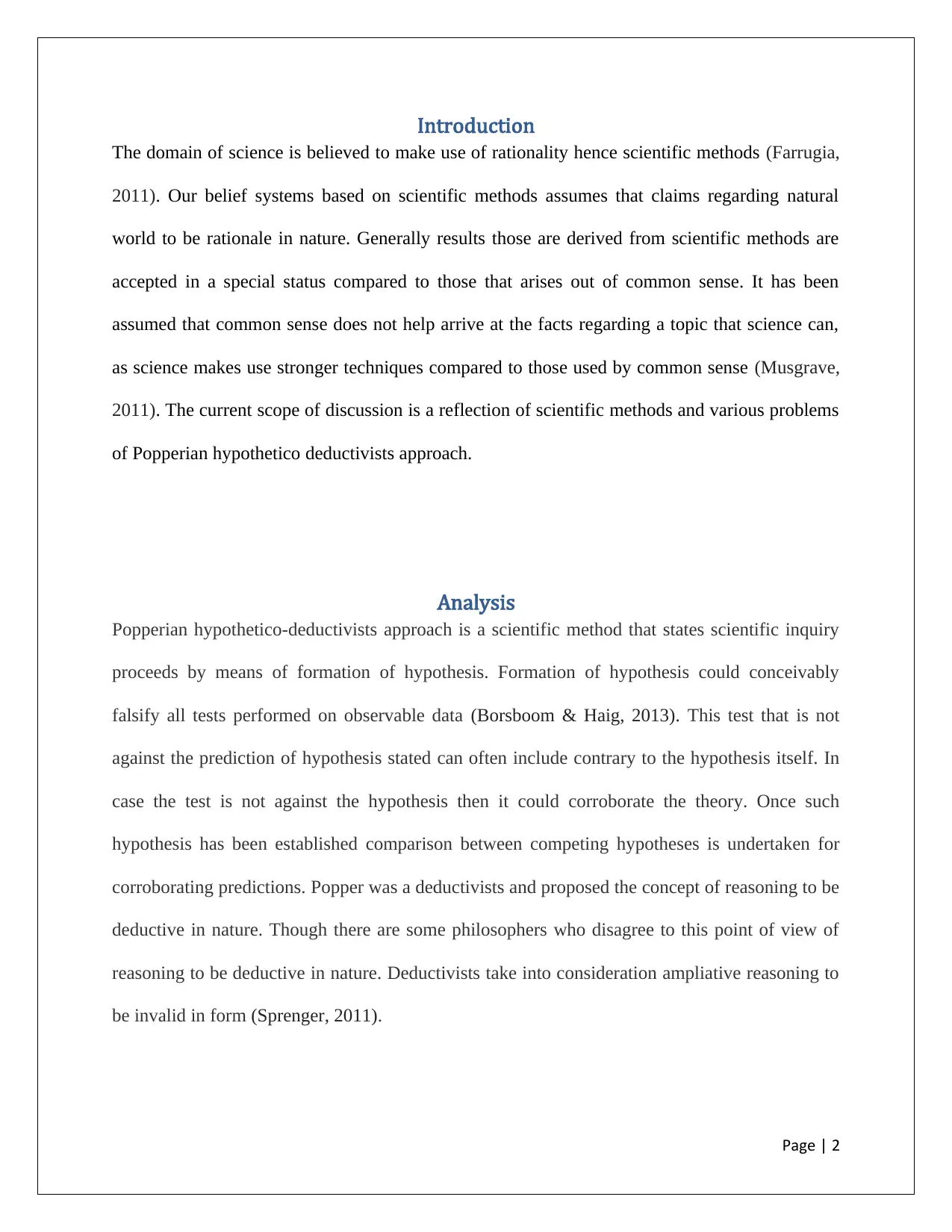
Introduction
The domain of science is believed to make use of rationality hence scientific methods (Farrugia,
2011). Our belief systems based on scientific methods assumes that claims regarding natural
world to be rationale in nature. Generally results those are derived from scientific methods are
accepted in a special status compared to those that arises out of common sense. It has been
assumed that common sense does not help arrive at the facts regarding a topic that science can,
as science makes use stronger techniques compared to those used by common sense (Musgrave,
2011). The current scope of discussion is a reflection of scientific methods and various problems
of Popperian hypothetico deductivists approach.
Analysis
Popperian hypothetico-deductivists approach is a scientific method that states scientific inquiry
proceeds by means of formation of hypothesis. Formation of hypothesis could conceivably
falsify all tests performed on observable data (Borsboom & Haig, 2013). This test that is not
against the prediction of hypothesis stated can often include contrary to the hypothesis itself. In
case the test is not against the hypothesis then it could corroborate the theory. Once such
hypothesis has been established comparison between competing hypotheses is undertaken for
corroborating predictions. Popper was a deductivists and proposed the concept of reasoning to be
deductive in nature. Though there are some philosophers who disagree to this point of view of
reasoning to be deductive in nature. Deductivists take into consideration ampliative reasoning to
be invalid in form (Sprenger, 2011).
Page | 2
The domain of science is believed to make use of rationality hence scientific methods (Farrugia,
2011). Our belief systems based on scientific methods assumes that claims regarding natural
world to be rationale in nature. Generally results those are derived from scientific methods are
accepted in a special status compared to those that arises out of common sense. It has been
assumed that common sense does not help arrive at the facts regarding a topic that science can,
as science makes use stronger techniques compared to those used by common sense (Musgrave,
2011). The current scope of discussion is a reflection of scientific methods and various problems
of Popperian hypothetico deductivists approach.
Analysis
Popperian hypothetico-deductivists approach is a scientific method that states scientific inquiry
proceeds by means of formation of hypothesis. Formation of hypothesis could conceivably
falsify all tests performed on observable data (Borsboom & Haig, 2013). This test that is not
against the prediction of hypothesis stated can often include contrary to the hypothesis itself. In
case the test is not against the hypothesis then it could corroborate the theory. Once such
hypothesis has been established comparison between competing hypotheses is undertaken for
corroborating predictions. Popper was a deductivists and proposed the concept of reasoning to be
deductive in nature. Though there are some philosophers who disagree to this point of view of
reasoning to be deductive in nature. Deductivists take into consideration ampliative reasoning to
be invalid in form (Sprenger, 2011).
Page | 2
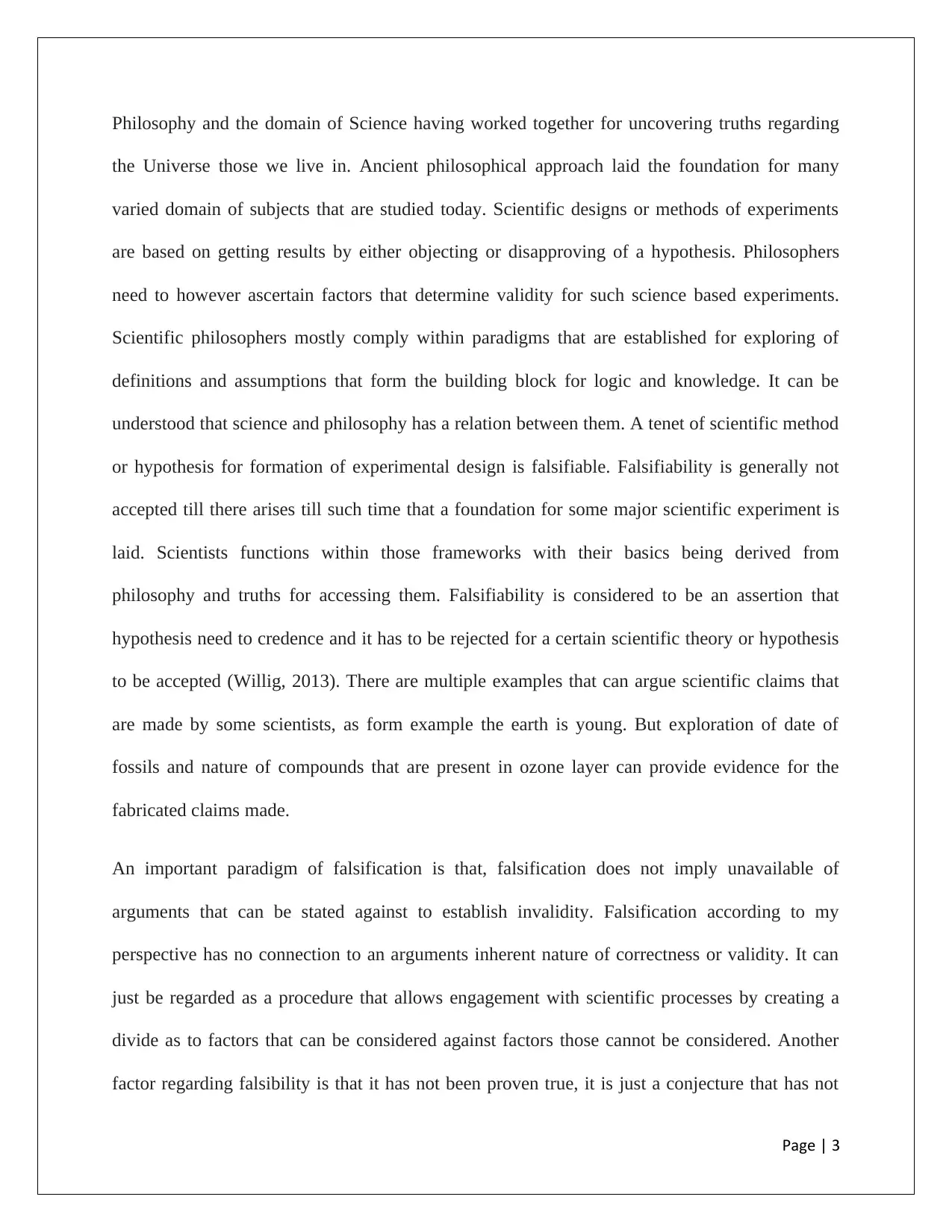
Philosophy and the domain of Science having worked together for uncovering truths regarding
the Universe those we live in. Ancient philosophical approach laid the foundation for many
varied domain of subjects that are studied today. Scientific designs or methods of experiments
are based on getting results by either objecting or disapproving of a hypothesis. Philosophers
need to however ascertain factors that determine validity for such science based experiments.
Scientific philosophers mostly comply within paradigms that are established for exploring of
definitions and assumptions that form the building block for logic and knowledge. It can be
understood that science and philosophy has a relation between them. A tenet of scientific method
or hypothesis for formation of experimental design is falsifiable. Falsifiability is generally not
accepted till there arises till such time that a foundation for some major scientific experiment is
laid. Scientists functions within those frameworks with their basics being derived from
philosophy and truths for accessing them. Falsifiability is considered to be an assertion that
hypothesis need to credence and it has to be rejected for a certain scientific theory or hypothesis
to be accepted (Willig, 2013). There are multiple examples that can argue scientific claims that
are made by some scientists, as form example the earth is young. But exploration of date of
fossils and nature of compounds that are present in ozone layer can provide evidence for the
fabricated claims made.
An important paradigm of falsification is that, falsification does not imply unavailable of
arguments that can be stated against to establish invalidity. Falsification according to my
perspective has no connection to an arguments inherent nature of correctness or validity. It can
just be regarded as a procedure that allows engagement with scientific processes by creating a
divide as to factors that can be considered against factors those cannot be considered. Another
factor regarding falsibility is that it has not been proven true, it is just a conjecture that has not
Page | 3
the Universe those we live in. Ancient philosophical approach laid the foundation for many
varied domain of subjects that are studied today. Scientific designs or methods of experiments
are based on getting results by either objecting or disapproving of a hypothesis. Philosophers
need to however ascertain factors that determine validity for such science based experiments.
Scientific philosophers mostly comply within paradigms that are established for exploring of
definitions and assumptions that form the building block for logic and knowledge. It can be
understood that science and philosophy has a relation between them. A tenet of scientific method
or hypothesis for formation of experimental design is falsifiable. Falsifiability is generally not
accepted till there arises till such time that a foundation for some major scientific experiment is
laid. Scientists functions within those frameworks with their basics being derived from
philosophy and truths for accessing them. Falsifiability is considered to be an assertion that
hypothesis need to credence and it has to be rejected for a certain scientific theory or hypothesis
to be accepted (Willig, 2013). There are multiple examples that can argue scientific claims that
are made by some scientists, as form example the earth is young. But exploration of date of
fossils and nature of compounds that are present in ozone layer can provide evidence for the
fabricated claims made.
An important paradigm of falsification is that, falsification does not imply unavailable of
arguments that can be stated against to establish invalidity. Falsification according to my
perspective has no connection to an arguments inherent nature of correctness or validity. It can
just be regarded as a procedure that allows engagement with scientific processes by creating a
divide as to factors that can be considered against factors those cannot be considered. Another
factor regarding falsibility is that it has not been proven true, it is just a conjecture that has not
Page | 3
⊘ This is a preview!⊘
Do you want full access?
Subscribe today to unlock all pages.

Trusted by 1+ million students worldwide
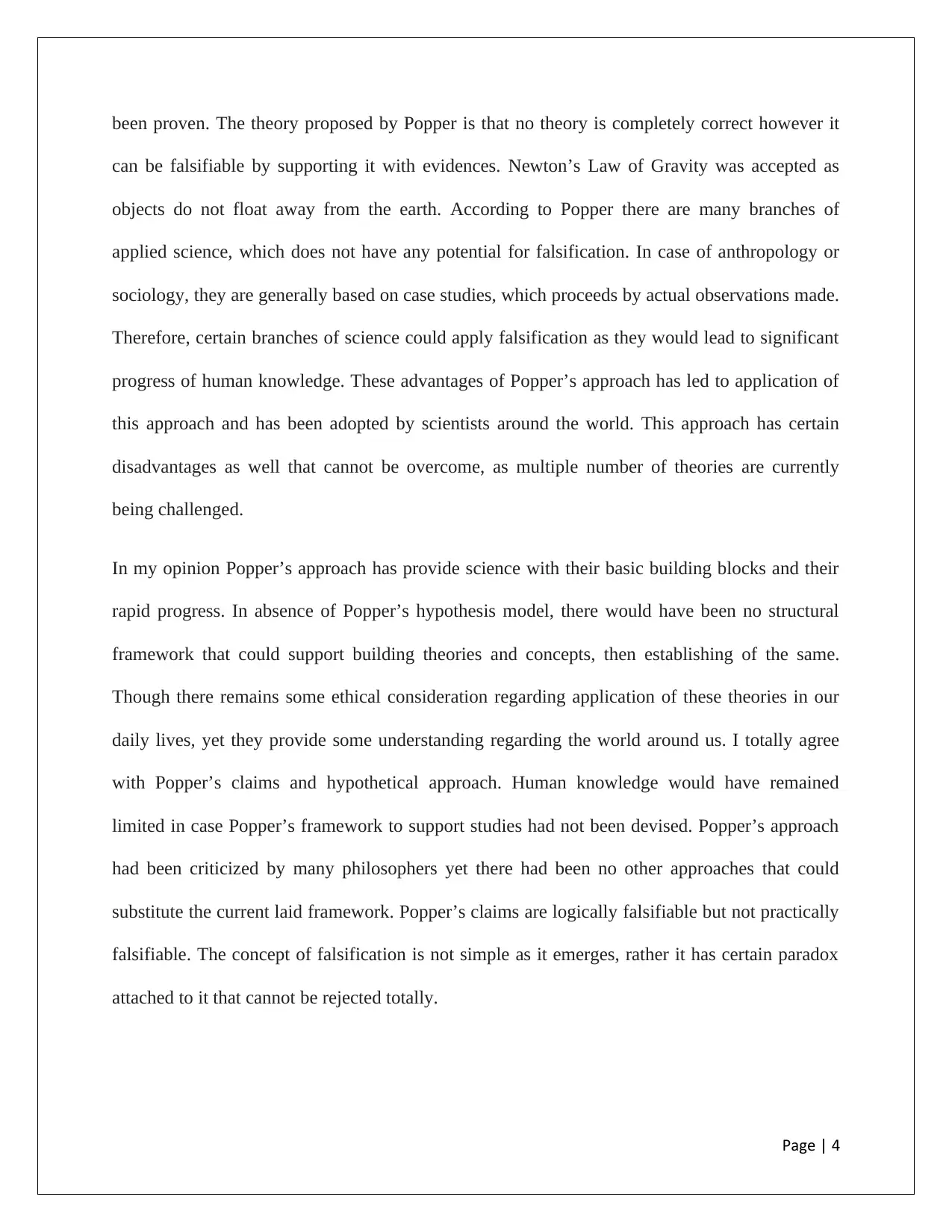
been proven. The theory proposed by Popper is that no theory is completely correct however it
can be falsifiable by supporting it with evidences. Newton’s Law of Gravity was accepted as
objects do not float away from the earth. According to Popper there are many branches of
applied science, which does not have any potential for falsification. In case of anthropology or
sociology, they are generally based on case studies, which proceeds by actual observations made.
Therefore, certain branches of science could apply falsification as they would lead to significant
progress of human knowledge. These advantages of Popper’s approach has led to application of
this approach and has been adopted by scientists around the world. This approach has certain
disadvantages as well that cannot be overcome, as multiple number of theories are currently
being challenged.
In my opinion Popper’s approach has provide science with their basic building blocks and their
rapid progress. In absence of Popper’s hypothesis model, there would have been no structural
framework that could support building theories and concepts, then establishing of the same.
Though there remains some ethical consideration regarding application of these theories in our
daily lives, yet they provide some understanding regarding the world around us. I totally agree
with Popper’s claims and hypothetical approach. Human knowledge would have remained
limited in case Popper’s framework to support studies had not been devised. Popper’s approach
had been criticized by many philosophers yet there had been no other approaches that could
substitute the current laid framework. Popper’s claims are logically falsifiable but not practically
falsifiable. The concept of falsification is not simple as it emerges, rather it has certain paradox
attached to it that cannot be rejected totally.
Page | 4
can be falsifiable by supporting it with evidences. Newton’s Law of Gravity was accepted as
objects do not float away from the earth. According to Popper there are many branches of
applied science, which does not have any potential for falsification. In case of anthropology or
sociology, they are generally based on case studies, which proceeds by actual observations made.
Therefore, certain branches of science could apply falsification as they would lead to significant
progress of human knowledge. These advantages of Popper’s approach has led to application of
this approach and has been adopted by scientists around the world. This approach has certain
disadvantages as well that cannot be overcome, as multiple number of theories are currently
being challenged.
In my opinion Popper’s approach has provide science with their basic building blocks and their
rapid progress. In absence of Popper’s hypothesis model, there would have been no structural
framework that could support building theories and concepts, then establishing of the same.
Though there remains some ethical consideration regarding application of these theories in our
daily lives, yet they provide some understanding regarding the world around us. I totally agree
with Popper’s claims and hypothetical approach. Human knowledge would have remained
limited in case Popper’s framework to support studies had not been devised. Popper’s approach
had been criticized by many philosophers yet there had been no other approaches that could
substitute the current laid framework. Popper’s claims are logically falsifiable but not practically
falsifiable. The concept of falsification is not simple as it emerges, rather it has certain paradox
attached to it that cannot be rejected totally.
Page | 4
Paraphrase This Document
Need a fresh take? Get an instant paraphrase of this document with our AI Paraphraser
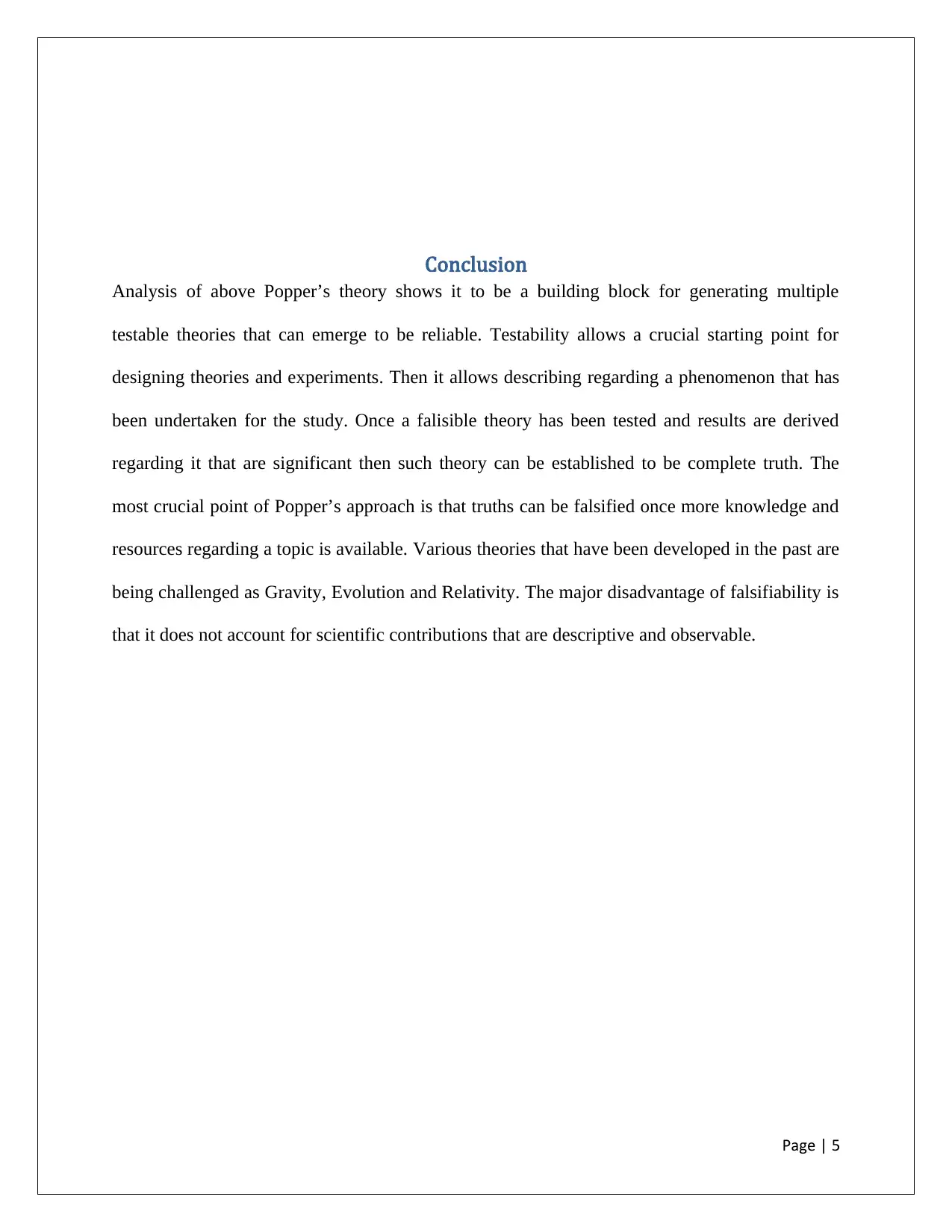
Conclusion
Analysis of above Popper’s theory shows it to be a building block for generating multiple
testable theories that can emerge to be reliable. Testability allows a crucial starting point for
designing theories and experiments. Then it allows describing regarding a phenomenon that has
been undertaken for the study. Once a falisible theory has been tested and results are derived
regarding it that are significant then such theory can be established to be complete truth. The
most crucial point of Popper’s approach is that truths can be falsified once more knowledge and
resources regarding a topic is available. Various theories that have been developed in the past are
being challenged as Gravity, Evolution and Relativity. The major disadvantage of falsifiability is
that it does not account for scientific contributions that are descriptive and observable.
Page | 5
Analysis of above Popper’s theory shows it to be a building block for generating multiple
testable theories that can emerge to be reliable. Testability allows a crucial starting point for
designing theories and experiments. Then it allows describing regarding a phenomenon that has
been undertaken for the study. Once a falisible theory has been tested and results are derived
regarding it that are significant then such theory can be established to be complete truth. The
most crucial point of Popper’s approach is that truths can be falsified once more knowledge and
resources regarding a topic is available. Various theories that have been developed in the past are
being challenged as Gravity, Evolution and Relativity. The major disadvantage of falsifiability is
that it does not account for scientific contributions that are descriptive and observable.
Page | 5
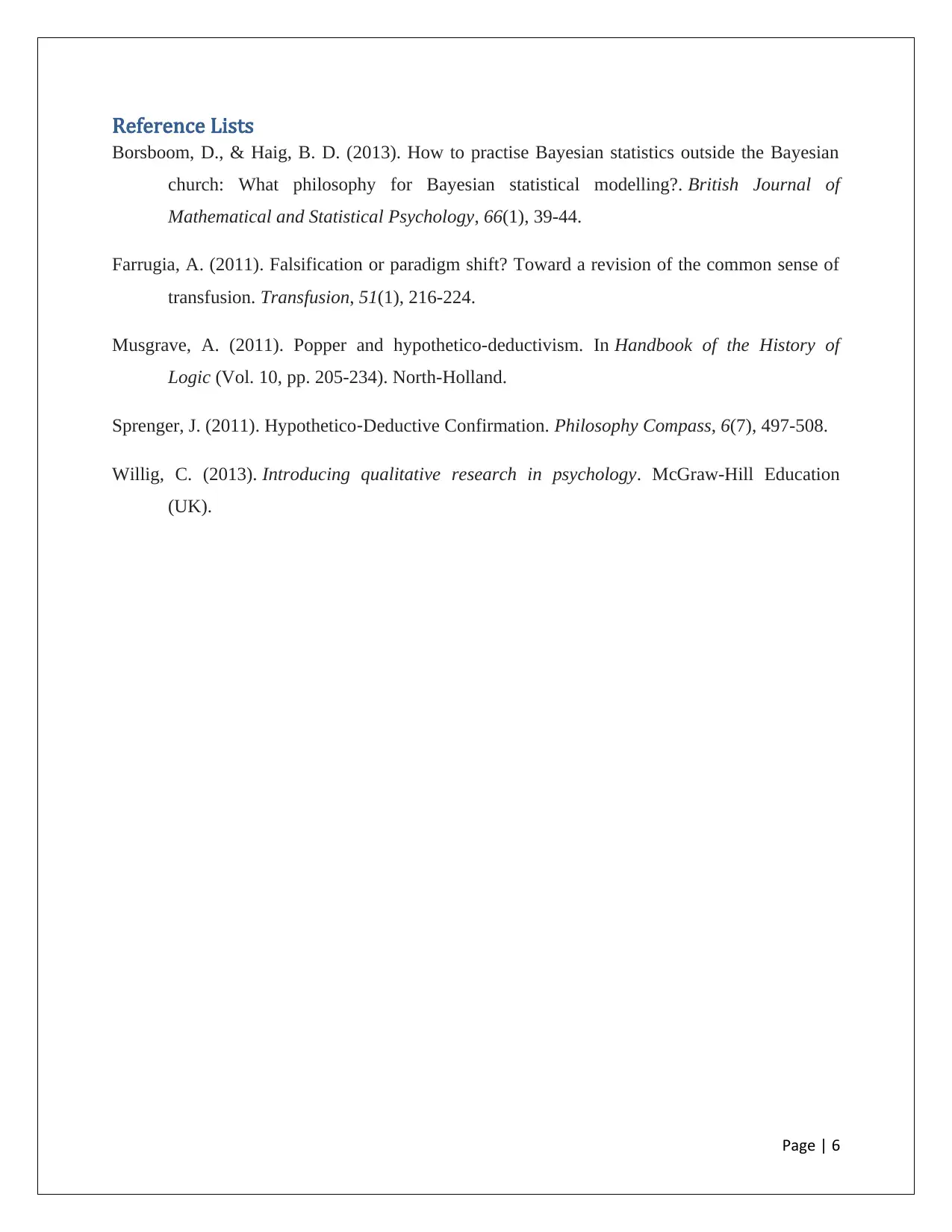
Reference Lists
Borsboom, D., & Haig, B. D. (2013). How to practise Bayesian statistics outside the Bayesian
church: What philosophy for Bayesian statistical modelling?. British Journal of
Mathematical and Statistical Psychology, 66(1), 39-44.
Farrugia, A. (2011). Falsification or paradigm shift? Toward a revision of the common sense of
transfusion. Transfusion, 51(1), 216-224.
Musgrave, A. (2011). Popper and hypothetico-deductivism. In Handbook of the History of
Logic (Vol. 10, pp. 205-234). North-Holland.
Sprenger, J. (2011). Hypothetico‐Deductive Confirmation. Philosophy Compass, 6(7), 497-508.
Willig, C. (2013). Introducing qualitative research in psychology. McGraw-Hill Education
(UK).
Page | 6
Borsboom, D., & Haig, B. D. (2013). How to practise Bayesian statistics outside the Bayesian
church: What philosophy for Bayesian statistical modelling?. British Journal of
Mathematical and Statistical Psychology, 66(1), 39-44.
Farrugia, A. (2011). Falsification or paradigm shift? Toward a revision of the common sense of
transfusion. Transfusion, 51(1), 216-224.
Musgrave, A. (2011). Popper and hypothetico-deductivism. In Handbook of the History of
Logic (Vol. 10, pp. 205-234). North-Holland.
Sprenger, J. (2011). Hypothetico‐Deductive Confirmation. Philosophy Compass, 6(7), 497-508.
Willig, C. (2013). Introducing qualitative research in psychology. McGraw-Hill Education
(UK).
Page | 6
⊘ This is a preview!⊘
Do you want full access?
Subscribe today to unlock all pages.

Trusted by 1+ million students worldwide
1 out of 6
Related Documents
Your All-in-One AI-Powered Toolkit for Academic Success.
+13062052269
info@desklib.com
Available 24*7 on WhatsApp / Email
![[object Object]](/_next/static/media/star-bottom.7253800d.svg)
Unlock your academic potential
Copyright © 2020–2026 A2Z Services. All Rights Reserved. Developed and managed by ZUCOL.


